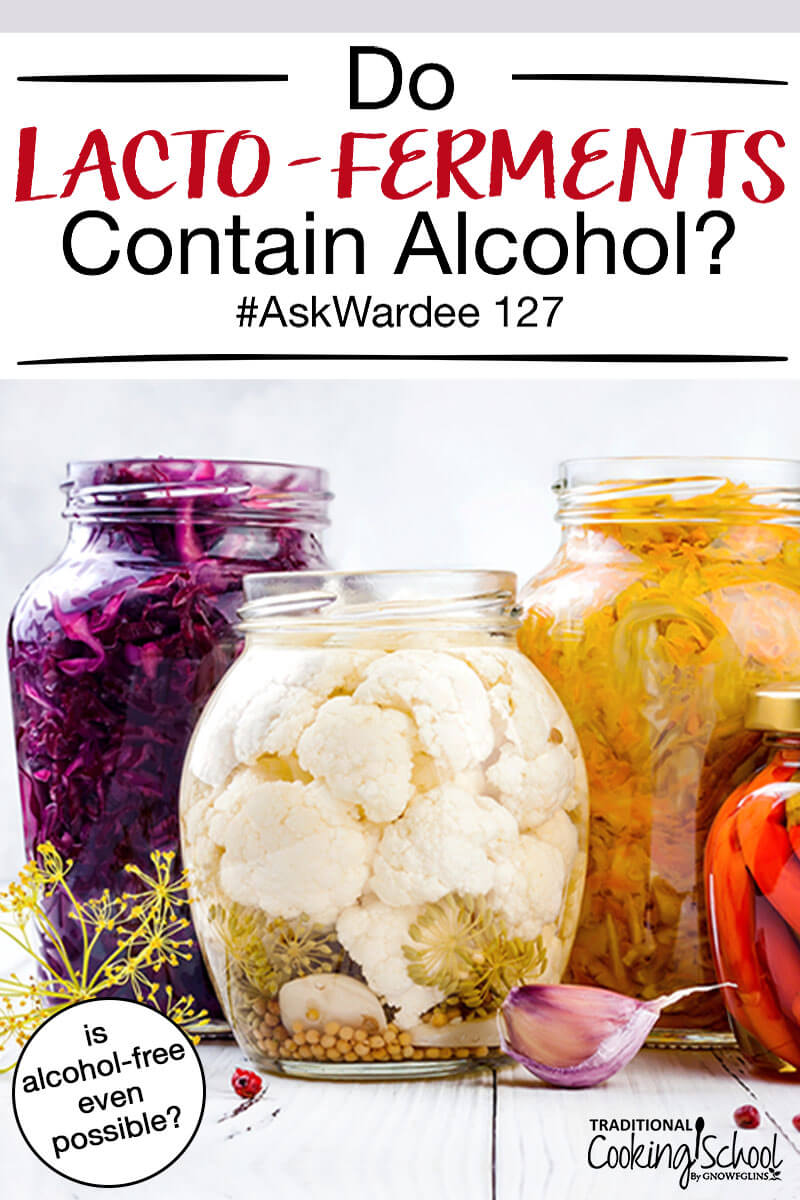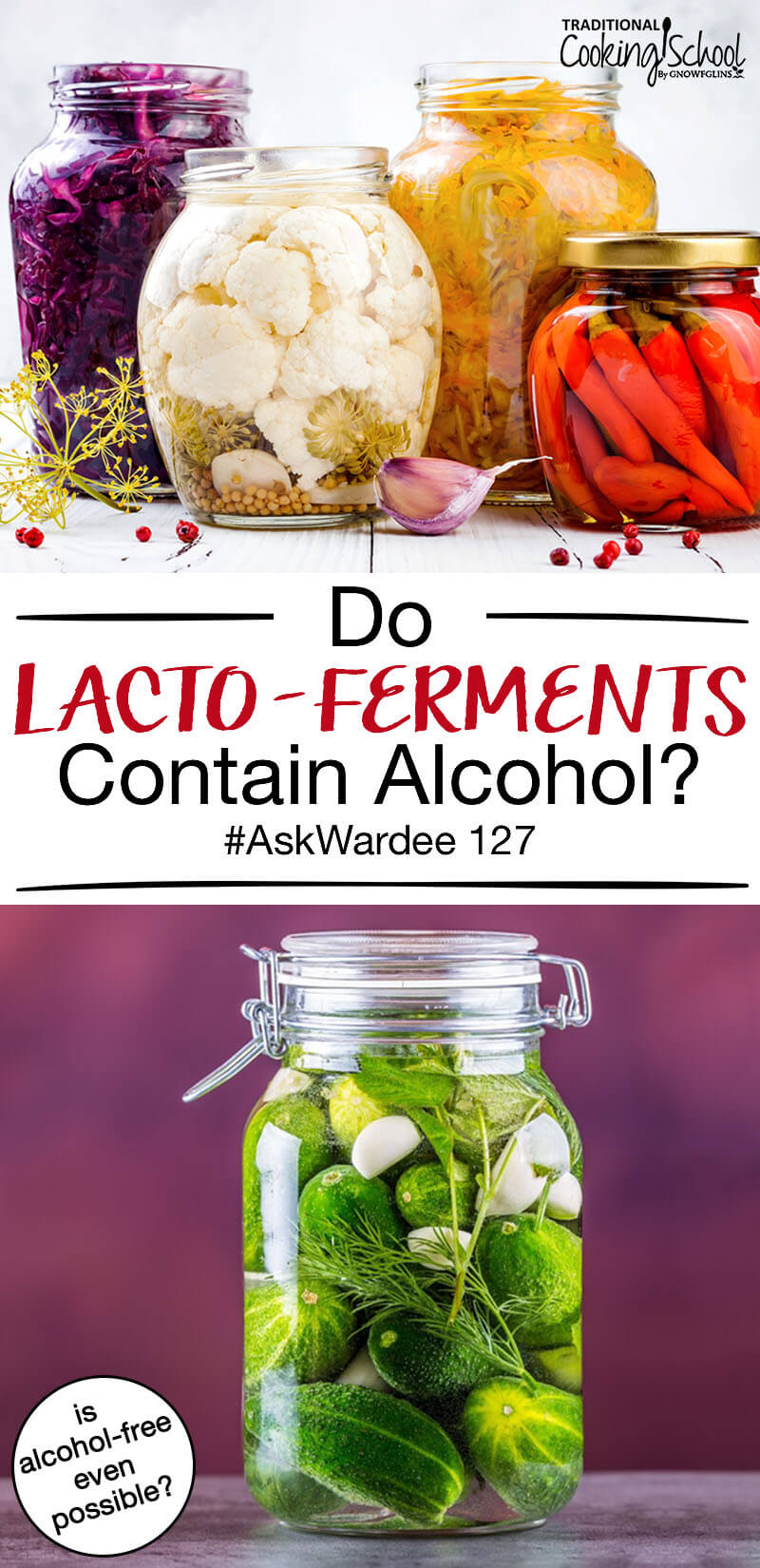
Do all ferments contain alcohol? Is it possible to ferment without any alcohol produced?
asked Elizabeth H.
It’s a question I get a lot (!!!) and I’m happy to answer it today for #AskWardee.
Subscribe to #AskWardee on iTunes, Stitcher, YouTube, or the Podcasts app.
Table Of Contents
The Question: Do Lacto-Ferments Contain Alcohol?
Elizabeth H. asked:
Hi! I’m interested in starting to use ferments in our home and am doing some research on lactic acid fermentation and wondered if you could help me. I have been looking at your website and from what I understand lactic acid fermentation does not produce alcohol, is this correct? Or does it produce a small amount of alcohol? If it does produce alcohol, is there any type of fermentation that eliminates the production of alcohol completely? Thank you for your help!
Elizabeth, thank you for your question!
Because we’re featuring your question today’s #AskWardee, you’re getting a gift — a FREE Mini eCourse! Our team will be in contact with you so you can choose which one you’d like!)
How Lacto-Fermentation Works: Fermented Means Alcoholic, For The Most Part
Lacto-fermentation involves the work of lactic acid bacteria consuming the sugars and starches in foods and through that process, creating a fermented food such as sauerkraut. During the fermentation of that food (in this case, cabbage), these beneficial bacteria produce lactic acid, ethanol (a form of alcohol), and carbon dioxide.
However, there are certain strains of bacteria that produce only lactic acid, not ethanol or alchohol, including Streptococcus thermophiles (used in yogurt), Lactobacillus lactis (buttermilk and cheese), Lactobacillus bulgarius (yogurt), and Pediococcus (sauerkraut). This fermentation is called homolactic fermentation, while the former is called heterolactic. (Source.)
And often our ferments have some yeast activity going on, too. Yeast fermentation produces alcohol (which converts to vinegar with time).
Although I could be wrong about this, I reason that most ferments we do in our homes involve diverse combinations of lactic acid bacteria and yeasts, meaning we are nearly always going to produce some alcohol, often without even trying.
So if you’re still wondering… does yogurt contain alcohol? Even though certain bacteria used to culture yogurt don’t produce alcohol, we’re not normally making yogurt in a closed environment, so there will be other bacteria and yeast present producing alcohol.
It’s just the way it is. To avoid alcohol, one should avoid fermented foods. In other words, fermented means alcoholic.
But How Much Alcohol Is In Ferments?
Ok, so alcohol in ferments is hard to avoid. But how much is there? You might want to know this to decide whether or not it’s an amount you are willing to tolerate.
And there are very good reasons for knowing this because:
- certain medications shouldn’t mix with alcohol
- children shouldn’t consume alcohol
- pregnant moms shouldn’t consume alcohol
- alcoholics shouldn’t touch alcohol
- some people have religious reasons for not consuming alcohol
- and other reasons, too!
Even though I can’t give you specific amounts (there are so many variables), there are some guidelines that will help you determine which ferments are likely to have more alcohol than others.
First, fermented fruits and other high sugar/starch fermented foods and beverages are likely to contain more alcohol, from .5% to 2% and possibly even higher, while low sugar/starch ferments such as sauerkraut probably do not have nearly as much.
If any ferment is fizzy, it could have a higher concentration of alcohol (such as a fizzy kefir or ginger beer or Kombucha). If you’ve been wondering if all fermented drinks contain alcohol, then the answer is yes, at least some. Naturally fermented sodas tend to be fizzy, and made with fruit — both of which encourage alcohol production.
If a ferment is done in an air-tight container, any alcohol produced is trapped inside and not allowed to disperse or convert to vinegar.
On the other hand, an open-air ferment may create alcohol initially, too, but the ferment being open allows that alcohol to disperse and convert to vinegar.
So you see there are a lot of variables!
How To Minimize Alcohol Production In Ferments
I am pretty sure you’ve already picked up on some of the “rules” you can follow to keep alcohol production down:
- ferment low starch/sugar foods
- if you do ferment sugary foods such as fruits, allow them to sit in the open air for awhile (days?) for the alcohol to disperse and/or convert to vinegar
- start your ferment in a closed fermenting container (such as Pickl-It or crock with water barrier) but then leave your ferment in the open air for the alcohol to disperse and/or convert to vinegar
- avoid fizzy ferments (and similarly ferment foods until done but not longer to minimize fizz)
In cast you’re interested, my friend Patty wrote an article, Fermenting In Pickl-It Jars, where she talked about using this closed air fermentation system to reduce alcohol content as well as other things (such as histamines).
More Fermenting Info, Reviews, and Recipes…
Check out my Lacto-Fermentation 101 Free Video Series RIGHT HERE.
And if you haven’t already, CLICK HERE to download our FREE “Fermenting Formulas” Cheat Sheet, where I share formulas so you can create your own safe ferments using the product you have on hand — salsas, relishes, krauts, beverages, and more!
We also have extensive archives of ferment recipes here!
Additional Fermenting Articles
- What Is Lacto-Fermentation? {Video}
- Troubleshooting Your Ferments (KYF172)
- Lacto-Fermentation 101 Video Series
- 7 Fermenting Mistakes You Might Be Making
- Which Water is Best for Fermenting?
- Which Kind of Salt Should I Use for Fermenting?
- Can I Use Alternative Sweeteners in Ferments?
- How to Tell if Your Kombucha is Moldy (And What to Do About It)
Any Questions Or Comments?
If you have other questions or comments about your own experience with fermentation and alcohol production, be sure to leave them in the comments!
Helpful Links
- FREE “Fermenting Formulas” Cheat Sheet
- Lacto-Fermentation 101 Video Series
- Ferment recipes archive
- Ohio Stoneware 3-Gallon Crock with water barrier
- Pickl-It fermenting kits (for converting Fido jars to be able to perform anaerobic fermentation)
- Pickle-Pro fermenting lids (not air-tight)
- Lacto-Fermentation eCourse (or Mini eCourse)
- Fermenting In Pickl-It Jars article
- Milk Kefir Recipe
- Honey-Sweetened Ginger Beer Recipe
- Kombucha Recipe
- Sauerkraut Recipe
What Is The #AskWardee Show?
The #AskWardee Show is the live weekly show devoted to answering your niggling questions about Traditional Cooking: whether it’s your sourdough starter, your sauerkraut, preserving foods, broth, superfoods or anything else to do with Traditional Cooking or your GNOWFGLINS lifestyle.
I share tips and resources, plus answer your questions about Traditional Cooking!
The Details
When: Wednesdays at 10am Pacific / 1pm Eastern
Where: Traditional Cooking School on Facebook Live or @TradCookSchool on Instagram Live
What If You Can’t Make It?
Don’t worry. You can catch the replays or listen to the podcast!
- Come back here to AskWardee.TV; all replays will be up within hours of airing live; the print notes are always posted at the same time I go live.
- Go to Traditional Cooking School on Facebook to view the Facebook Live replay or go to @TradCookSchool on Instagram on your phone or tablet (Instagram recording only lasts 24 hours).
- Subscribe to the #AskWardee podcast on iTunes, Stitcher, YouTube, or the Podcasts app. While you’re there, be sure to leave a rating and review!
Want To Get YOUR Question Answered?
Here’s how to submit your question. If we answer it on #AskWardee, you’ll get a gift!
- Tweet your question to @TradCookSchool on Twitter; use hashtag #AskWardee
- Send an email to wardee at AskWardee dot tv — add #AskWardee to your email so I know it’s for the show
Please do NOT add future questions for #AskWardee to the comments of this post because they might get missed!
Are you concerned about alcohol in ferments? Have you wondered before if all fermented drinks contain alcohol? What have you done about it?
We only recommend products and services we wholeheartedly endorse. This post may contain special links through which we earn a small commission if you make a purchase (though your price is the same).



I really enjoy sauerkraut, but can’t eat it. Every time I do I can’t stop coughing and wheezing. I have trouble breathing. I can eat canned sauerkraut, but read that that isn’t the real thing. I’m hesitant to try any fermented products. I was going to start fermenting at home. Guess I’ll have to skip it.
It sounds like you might be reacting to histamines that are present in some fermented foods. Wardee mentions in this post that there are ways to reduce histamines in the foods you ferment at home. Also, a gut-healing diet like GAPS might help you eventually be able to tolerate ferments better.
I have made lacto-fermented lemonade. I used 6 and a half cups of water and a half cup each of lemon juice, brown sugar and whey.
I let it in the counter for one day and a half at about 20-25°C and then put it in the fridge. It’s not fizzy. Would you say it is safe for kids to drink?
Hi, María,
Your lemonade sounds delicious! Just be aware that it likely contains some alcohol, so you should be cautious about having kids drink it. I hope that helps! Have a great day!
~Sonya, TCS Customer Success Team
I made a sweet potato puree ferment with saurkraut juice for my my baby and left it out on the counter for 24 hours then put it in a mason jar in the fridge. But it is super fizzy and tastes a bit alcoholic. I think I maybe needed to leave it in a airtight container?
Hi, Carolyn.
Leaving it in the air-tight container does not allow the alcohol to be disperse and convert to vinegar.
You can also try a shorter fermenting period, maybe 6-8 hours instead of 24.
~Danielle, TCs Customer Success Team
I am highly allergic to alcohol and react to water kefir and kombucha. I ferment a lot of veggies, sauerkraut, kimchi, lacto fermented veggies, plus fermented vegan cheeses, chillie sauce, sourdough and have never had a reaction to any of these. I have reacted to wine where the alcohol was removed. So I wonder if it is just the amount of alcohol or if I have just been lucky with my ferments? – I was making kombucha and water kefir until I made the connection that I was getting sick from it. I can however make kefir with coconut milk and consume it with no problem.
I notice that Whisky Dill Sauerkraut is very popular. Can I add Whisky when I make my kraut? If yes, when?
Hi Marjorie, Alcohol will kill the bacteria in the sauerkraut. We suggest if you’re going to added whiskey you should boil it first before putting it in the kraut. Although we still don’t know if that won’t kill the bacteria.
We really have no idea when to add it but would venture a guess that it should be added AFTER fermentation is done, and should be added cool, not hot after boiling it. And we wouldn’t soak it and probably would experiment a bit with how much to add.
~ Vicki, TCS Customer Success Team
I am glad you put the info about alcohol on your site. I am not able to use alcohol and was looking at some beef sticks that are made by fermenting them. That would not be a good thing for me. So again, thank you for the information.